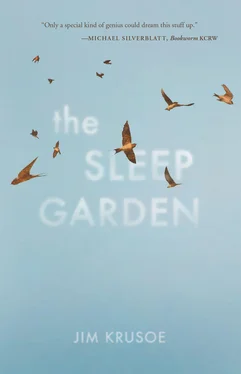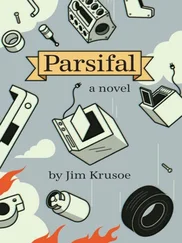Is Madeline one of those women he has heard about who can’t be satisfied by any man, but keeps on trying? Or maybe she’s like a comet, and he’s due for another visit.
Sometimes, walking by Heather’s room late at night he can hear Heather talking on her phone to some distant boyfriend of hers, just a word here and a word there, but what she says makes Raymond blush.
What would it be like to have someone talk to him that way?
Or to touch him?

Episode One, The Burrow , Scene Six
The kitchen. EVERYONE is seated around the kitchen table and each person demonstrates different degrees of impatience. Some tap their fingers, others inspect their nails, yet others rub their thumbs against one another. The table is left unset, with its surface empty.
Jeffery:
I suppose you are wondering why I wanted all of us to get together tonight. I promise, I wouldn’t take up your time if I didn’t think it was very important.
Madeline:
Well, that makes me feel
a lot
better. So what do you have to tell us?
Viktor:
And make it fast. Some of us have work to do, you know.
Jeffery:
All right. Here it goes. I’ll make it fast and simple. When was the last time any of us went out of the Burrow?
[silence]
Heather:
I remember the other day, I almost went out, but then something happened so I didn’t.
Madeline:
The same thing happened to me. I was about to go out, I think to a place I know about that sells gourmet foods and spices, when somebody interrupted me just when I was about to turn the knob, so I wound up postponing it. Was it you, Jeffery?
Viktor:
It certainly wasn’t me. Though I personally see no need to go out at all.
Jeffery:
Fair enough, but has it ever occurred to you that far from being satisfied tenants, we may be prisoners?
[general dismay]
Jeffery:
Think about it: Food arrives. Ray here gets chunks of wood and we have the Internet, but nobody goes anywhere. For all we know, we may as well be dead. And while we may not want to go out at the moment, someday we might, and I think it’s better to know the situation now than when it’s too late. Oh, and there’s one other possibility I thought of as well. Are any of you hiding as a part of some kind of federal program? You can tell me. It will go no further.
Madeline:
Jeffery, nobody here is hiding out from anything, but why don’t you just walk yourself over to the door and try to open it. It can’t be that hard.
Jeffery:
As a matter of fact, I did try, and more than once, and every time something came up to make me change my mind. I mean, I started with the full intention of walking out that door, and all of a sudden I was doing something else. It’s like I have no control over my actions at all when it comes to that door.
Viktor:
So why did you ask us here? Was it just to tell us about your problem? What’s the point?
RAYMOND stands as if he’s going to leave, then sits back down again.
Jeffery:
It’s simple. Here’s what I thought: Just to be sure I’m not making all this up, I thought that if we all walked to the door together, we could all go outside, and then, if anybody wanted to, they could turn around and go back inside again. I mean — we wouldn’t really have to leave the Burrow. It would just be a way to prove to ourselves that we can leave if we want to, and we would wind up feeling better.
Viktor:
You mean
you
would wind up feeling better.
Heather:
But suppose, if we are under some sort of spell or something, that once we left we couldn’t get back inside.
Raymond:
Suppose I walked out, leaving all my decoys, and then I couldn’t get back to them again.
RAYMOND starts to stand, but JEFFERY pushes him gently down.
Madeline:
Sit, Raymond. Actually, Jeffery, you have a point. If we are under some kind of spell — which I doubt — it would be better to know about it before it’s too late. Why don’t we try Jeffery’s idea, but when we go to the door, everyone should bring along the one thing they can’t do without. That way, if somehow we
are
locked out for some reason, we’ll be together, and at least we wouldn’t be starting everything over again from scratch.
Jeffery:
That sounds fair enough. Heather, would that make you feel better?
Heather:
I could do that. It wouldn’t have to be for long, would it?
Jeffery:
Raymond?
Raymond:
If everybody else is doing it, okay.
Jeffery:
Viktor?
Viktor:
I don’t know. Let me think about it. But maybe.
Jeffery:
All right. Let’s go back to our rooms and get the one thing that’s most important to us. We’ll meet at the door in fifteen minutes.

From the St. Nils Eagle
“Dead May Not Be Completely Dead, Scientists Claim”
Researchers from the University of Applied Medicine announced today that the dead might well be taking longer to die than previously thought. Even after a person is buried, university scientists report, it may take a dead person weeks, possibly years, to complete a process that in the past was believed to take only minutes.
“This is a complicated area,” stated Dr. Carlton Bates, head of the university’s Mortality Project, “and one relatively new to science. It may have to do with certain preservatives in food, or even household chemicals in current use, or the effects of modern drugs, such as multispectrum antibiotics. On the other hand, it may be as simple as the vast advances we have made in devices to measure deadness, what we like to call Mortality Meters.”
Bates explained that though a person may well appear to be dead, and for all intents and purposes is “dead,” the only way to tell for certain would be to interview that person, something that is currently not within the range of our capabilities. It could well be, he added, that for them nothing has changed in their lives in the least. He elaborated, “It may be that it’s time to use words less absolute than either ‘dead’ or ‘alive’ to describe various states of existence.” Instead, Bates proposed what he called a “Living Quotient,” which would have a built-in range, say, of 1 to 100, with 100 standing for “most alive” and 1 for “least alive.” Anything lower than that, would, of course, be dead, he concluded.
In a related development, Dr. Rajish Chandrapanir, a researcher in the field of neuromnemonics at the university’s pioneering Electromagnetic Imaging Department, was quoted as saying, “We have long known that we can stimulate memories in living brains through the application of localized electric current. There is every reason to believe the same techniques will work on the dead as well. The problem is only in determining exactly which memories, out of all those available, are to be accessed.” He explained that researchers in this field are especially interested in what he called “Separation Issues,” that is, learning how to preserve the most important memories and, at the same time, to leave behind 99.9 percent of the others, which he called “essentially worthless.” Dr. Chandrapanir concluded that this whole reevaluation of what he described as “the old life/death conundrum” could seriously challenge our current measures of longevity and, in the long run, threaten the assumptions inherent in many social programs.
Читать дальше













